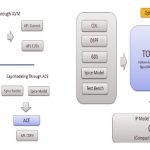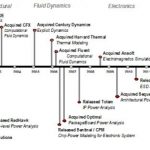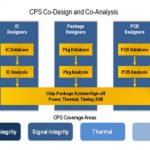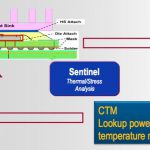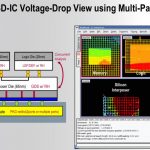At the onset of SoCs with multiple functionalities being packed together at the helm of technologies to improve upon performance and area; power, which was earlier neglected, has become critical and needs special attention in designing SoCs. And there comes reliability considerations as well due to multiple electrical and … Read More
Tag: redhawk
Full Chip IR Drop Analysis using Distributed Multi Processing
IR drop analysis across your board, package and SoC ensures that your Power Delivery Network (PDN) is robust, and that your system will function to spec. There are both static and dynamic approaches to IR drop analysis of a full-chip with billions of transistors, while the dynamic approach produces the most accurate results compared… Read More
Today’s Program is Brought To You by the Letter A
What do nVidia, Freescale and GlobalFoundries have in common? They are semiconductor companies? They are ARM licensees? They are doing 28nm chips? They all have the letter ‘a’ in their names?
All true, but that’s not what I was thinking of. But the letter ‘a’ is a clue since Apache (and Ansys) begin with ‘a’. All three companies have… Read More
Samsung’s Life of Pi @ Apache @ DAC
Last week I talked to Eileen You of Samsung-SSI to get a preview on what they will be talking about at Apache’s customer theater at DAC. Their presentation is titledThe Life of PI: SoC Power Integrity from Early Estimation to Design Sign-off. The ‘PI’ stands for Power Integrity.
Samsung-SSI’s operations… Read More
A Brief History of Apache Design
Apache Design Solutions was founded in 2001 by Andrew Yang and three researchers from HP Labs (Norman Chang, Shen Lin, Weize Xie). They realized that engineers striving to meet the goal of increased device miniaturization, as defined by Moore’s Law, would eventually hit stumbling blocks in their progress. The founding team believed… Read More
Apache Power Artist Capabilities II
This is the second part of my discussion with Paul Traynar, Apache’s PowerArtist guru. The first part discussed sequential reduction capabilities. Part I was here.
There are two big challenges with doing power analysis at the RTL level. Firstly, how do you get an accurate enough model of what the design will dissipate given… Read More
Chip-Package-System Solution Center
One of the really big changes about chip design is the way over the last decade or so it is no longer possible to design an SoC, a package for it to go in and the board for the package using different sets of tools and methodologies and then finally bond out the chip and solder it onto the board. The three systems, Chip-Package-System have… Read More
Apache Low Power Webinars
For those of you who didn’t get to DAC you can catch up on low power issues with Apache’s series of low-power webinars taking place late in July. All webinars are at 11am Pacific Time. Full details and registration on the Apache website here.… Read More
TSMC Theater Presentation: Apache
At the TSMC Theater Apache (don’t forget, now a subsidary of Ansys) talked about Emerging Challenges for Power, Signal and Reliability Verification on 3D-IC and Silicon Interposer Designs. The more I see about the costs and challenges of 20/22nm and below, the more I think that these 3D and 2.5D approaches are going to be … Read More
RedHawk: On to the Future
For many, maybe most, big designs, Apache’s RedHawk is the signoff tool for analyzing issues around power: electromigration, power supply droop, noise, transients and so on. But the latest designs have some issues: they are enormous (so you can’t just analyze them naively any more than you can run a Spice simulation… Read More


